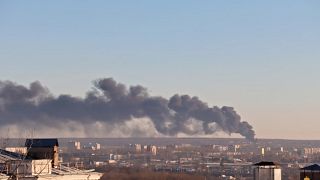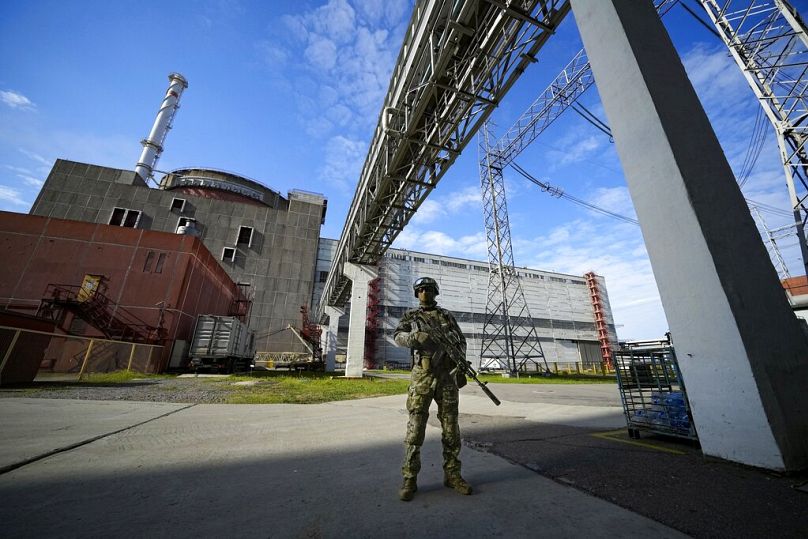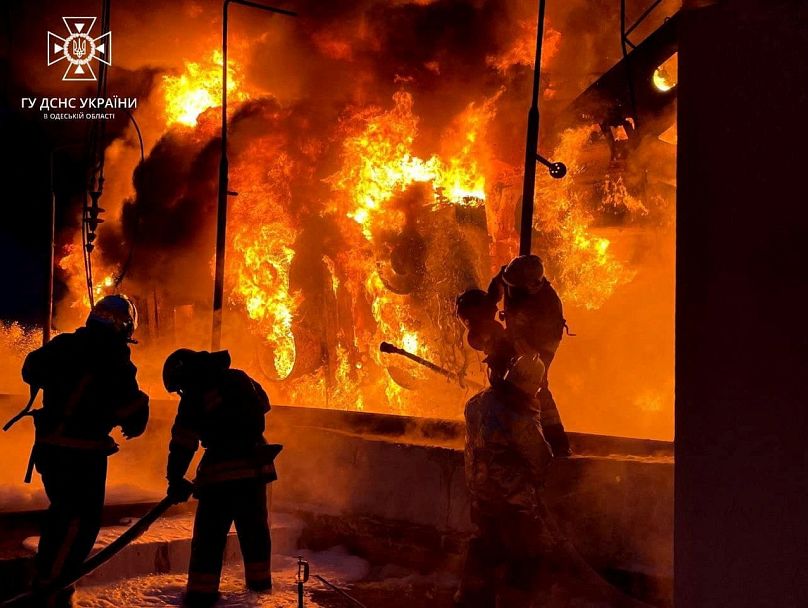A drone strike hit a third Russian airfield on Tuesday from a drone strike, a day after Ukraine proved its capacity to target military bases deep into Russian air space.
The latest attack was confirmed by officials in the Russian city of Kursk, who released pictures of smoke rising from the airfield in the early morning hours of Tuesday. The governor said the strike hit an oil storage tank, but there were no casualties.
Strikes on Monday, which Russia attributed to Ukraine, hit the Engels air base, which hosts Russia’s fleet of giant strategic bombers, and in Ryazan, where Russian authorities said three service people died. Moscow says the strikes were conducted using Soviet-era drones.
Kyiv has not claimed responsibility for the strikes but has celebrated them. The New York Times, citing a senior Ukrainian official, said the drones involved in Monday’s attacks were launched from Ukrainian territory, and at least one of the strikes was made with the help of special forces close to the base.
2. Russia claims to have hit Ukraine’s military command system
Russia’s defence ministry claims to have struck Ukraine’s military command system on Monday with a massive high-precision strike, as reported by the country’s RIA news agency. The report could not be independently verified.
Ukraine has not confirmed the strike, but the country’s military intelligence chief Kyrylo Budanov said on Tuesday that Moscow’s stocks are coming to an end, though he added that the country has enough high-precision missiles to conduct several more big air strikes on Ukraine before it runs out.
3. Russia accuses Ukraine of ‘nuclear terrorism’ over the shelling of the Zaporizhzhia plant
Russian Defence Minister Sergei Shoigu has accused Kyiv of “nuclear terrorism,” saying that Ukraine was continuing to shell the Zaporizhzhia nuclear power plant to deliberately create the threat of a possible nuclear catastrophe.
On Tuesday, Shoigu said that Ukraine had fired 33 large-calibre shells at the plant in the last two weeks. He claimed that most were intercepted by Russian air defences, but added that “some still hit objects that affect the safe operation of the nuclear power plant.”
The minister said that Russian forces were taking “all measures” to ensure the safety of the power plant in the face of Kyiv’s alleged attacks, which Moscow sees as “nuclear terrorism.”
Shoigu’s claims have not been independently verified, but Ukraine denies targeting the facility, which has been under the control of Russian forces since the beginning of the Russian invasion of Ukraine and it’s been at the centre of international attention and concerns for months now.
In recent months, as fighting raged around Zaporizhzhia, both Ukraine and Russia denied shelling the nuclear power plant, Europe’s largest, accusing the other of targeting the facility. Kyiv has also accused Moscow of using the plant as a de facto weapons depot.
The United Nations’ International Atomic Energy Agency is pushing to create a security zone around the plant, but the idea has yet to be implemented. Russian Deputy Foreign Minister Sergei Ryabkov said on Tuesday there were “positive dynamics” in discussions with the IAEA on the idea, Russia’s state news agency TASS reported.
4. Ukraine downed more than 60 missiles launched by Russia, authorities say
Ukraine’s air force command claims to have shot down more than 60 of over 70 missiles launched by Russia in a mass missile strike on Monday. The Russian strikes came only hours after explosions in two military bases were reported deep into Russian territory.
The strikes targeted once again Ukraine’s energy grid, according to Ukraine’s authorities, threatening to leave the country in the dark on what has been called one of the coldest days of the year. The mass strike knocked out power in several regions across Ukraine and damaged the country’s energy infrastructure, authorities said.
But president Volodymyr Zelenskyy said the power was quickly being restored. “Air defences shot down most of the rockets, and energy workers have already started to restore electricity,” he said.
At least four people were killed in the strikes, according to Zelenskyy.
5. Russia continues manufacturing new missiles despite Western sanctions
Some of the cruise missiles that Russia launched on Ukraine’s critical infrastructure on November 23 were recently manufactured, weapons investigators in Kyiv found, proving that Moscow found a way to go around Western sanctions which should have prevented Russia from getting a hold of components necessary to make the munitions.
A report released by investigators on Monday found that one of the missiles which knocked out power and caused water shortages in the Ukrainian capital in late November was made this summer, while another one was manufactured after September — months after the West imposed sanctions that should have hindered Moscow from creating advanced guided missiles like the Kh-101 that hit Kyiv.
The Conflict Armament Research group, the Britain-based independent group which conducted the research, suggested that Russia must have found a way to obtain the components necessary to manufacture the munitions despite the sanctions or that it had a stockpile before the measures were imposed.
6. Ukrainian embassies in Europe receive more ‘bloody packages’, Ukraine says
Ukrainian embassies in Romania and Denmark have received similar “bloody packages” to the ones received by several Ukrainian diplomatic buildings last week, Ukraine’s foreign minister Dmytro Kuleba said on Tuesday.
On Friday, Oleg Nikolenko — a spokesman at Ukraine’s foreign ministry — said that Ukrainian embassies and consulates in seven European countries had received blood-stained parcels containing animal eyes during the previous week, the meaning of which Ukrainian authorities were still analysing.
No one has claimed responsibility for sending the packages, which have followed reports of letter bombs sent to the Ukrainian embassy in Madrid and other diplomatic buildings in Spain. Kuleba has previously condemned the sending of the bloody packages as a “well-planned campaign of terror and intimidation of Ukrainian embassies and consulates”.
7. Latvia revokes the license of the independent Russian channel TV Rain
The Latvian broadcasting regulator has revoked Latvia has revoked the license of Russia’s most prominent independent television channel, TV Rain, accusing it of spreading “deliberately false information about the actions of Russian military personnel” in Ukraine.
The decision by the Latvian broadcasting regulator followed the unscripted comments by a presenter saying they hoped the station’s efforts would help provide Russian troops with basic equipment and amenities. The journalist has since been fired and TV Rain has apologised to its viewers, but the remarks led Latvia’s State Security Service to launch an investigation into the incident.
TV Rain was forced to broadcast from Latvia and other countries in July after being kicked out of Moscow in the aftermath of the beginning of Russia’s invasion of Ukraine. The station was then banned by the Kremlin for spreading “deliberately false information about the actions of Russian military personnel” in Ukraine.
But the station has recently been courting controversy in Latvia too, receiving a €10,000 fine by the Latvian regulator for displaying a map of Russia which included the occupied territory of Crimea and calling Moscow troops in Ukraine “our army.”
“In connection with the threat to the national security and public order, [the regulator] has made a decision this morning to annul the broadcast licence of TV Rain,” Ivars Abolins said on Twitter, adding the broadcasts will cease on Thursday.


